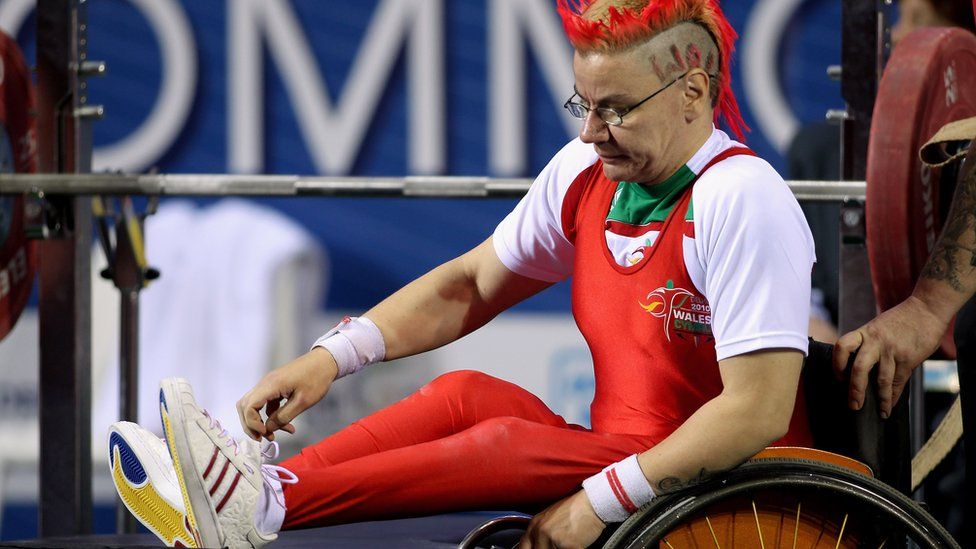ARTICLE AD BOX
 Image source, Getty Images
Image source, Getty Images
Julie Salmon represented Wales at the 2010 Delhi Commonwealth Games
By Jordan Davies & Tony Brown
BBC News
Once one of the strongest women in Wales, former powerlifter Julie Salmon now struggles to open her front door due to being confined to a wheelchair.
TV presenter Matthew Bassett, who suffered a spinal cord injury 11 years ago, explores whether enough has been done to help prevent isolation among disabled people.
"My carers say to me: 'Do you need anything done now?' I say: 'Yeah, a new life'."
Former Paralympian Julie, 54, needs help to open her front door.
As a wheelchair user myself, it's so disheartening to see someone who was one of the strongest women in Wales feeling so lonely and isolated in her own home.
Some disabled people have said very little has improved since landmark legislation more than 10 years ago, I have seen with my own eyes how little things have changed for some.
The Welsh government said it was "fully committed to advancing equality for all disabled people in Wales".
However, there needs to be major improvements to disability access, in all kinds of places, to prevent people becoming lonely.
Image source, Getty Images
Image caption,Julie competed at the Delhi games after representing Team GB at the Athens Paralympics
I sustained a spinal cord injury when I was 19, diving into the sea and hitting my head on a sand bank.
Julie, who lives near Pontypridd, Rhondda Cynon Taf, was just four when she was hit by a car, leaving her paraplegic.
It didn't stop her aiming high and she became one of Wales' strongest women competing in the Delhi Commonwealth Games and the Athens Paralympic Games.
But she cannot even open or close her front door without help and said she wants more from her care.
"I wake up in the morning, wait for the district nurses to come in, and then I go roaming the streets.
"Then I wait outside for someone to come along and open my door, and then wait for my night carers to come in the night," she said.
"You're either a prisoner in or a prisoner out. I just want to get back into sport, I want to be healthy, I want to go on holidays, I want to be a normal person.
"I just feel like what's the worth of living anymore, or why am I disabled?
"In powerlifting and sport, they always try to say to you 'forget the negatives and make it a positive'. But at the moment it feels like I can't make a positive."
Unfortunately, there are many cases like Julie's, but all it takes are simple adaptations like an accessible door, a suitable care package and greater understanding and things could change dramatically.
Julie said she sometimes feels like a prisoner in her own home
A plan to tackle disabled access, independent living and employment in Wales is due to be published next year by the disability rights taskforce.
Time and time again we have seen the same problems - poor accessibility, a lack of carers, stretched mental health services and unsuitable care packages preventing people from living fulfilling lives.
Landmark equality legislation was introduced more than a decade ago aimed at protecting disabled people from discrimination, improving access and helping with employment.
Dr Gareth Thomas is a psychologist and set up Adapt Gateway which helps support people with disabilities.
He sustained his spinal cord injury in a car accident while in the military, having served as a soldier in Bosnia and Iraq.
Image source, Gareth Thomas
Image caption,Dr Gareth Thomas has been researching disability for the past 16 years
For the past 16 years he has been researching disability, and said there were thousands of people in Wales with a spinal cord injury who rarely leave home.
According to his research, a lack of public access for wheelchair users is one of the main barriers to people leaving their home.
Many people - me included - do not want to rely on others to travel, we do not want to think of ourselves as a burden.
There can also be health problems connected to our injuries, sometimes our bodies let us down.
Some disabled people, understandably, just do not want to deal with these issues, so stay at home.
Matthew Bassett (left) met Dr Thomas (right) to discuss his research into accessibility for wheelchair users
Dr Thomas said very little had improved for some people with a disability since the Equality Act in 2010, or even when he was injured in the 1990s.
"Our idea of accessibility and a business's idea of accessibility are completely different. If you think that in a workplace for instance if you get a disabled toilet... they think they've done their job, it's just not the case.
"Even going to a restaurant, they will have an accessible toilet, but it will be right at the back of the building and maybe it will be up two steps.
"In 30 or 40 years nothing has changed - the way life is now where everything matters, disabled people matter, we matter - but who do we matter to?"
When you think that in Wales there are thousands of people living with a spinal injury, many more with a disability, and a fraction of us are in paid work or volunteering, it makes you question why.
The Welsh government said the specification for specialist rehabilitation services across all its seven health boards was being updated.
A spokesman added: "We are fully committed to advancing equality for all disabled people in Wales.
"We believe that independent living should not simply be about basic need, but should help ensure all disabled people are able to equally participate in society and can reach their full potential."

 1 year ago
38
1 year ago
38








 English (US) ·
English (US) ·